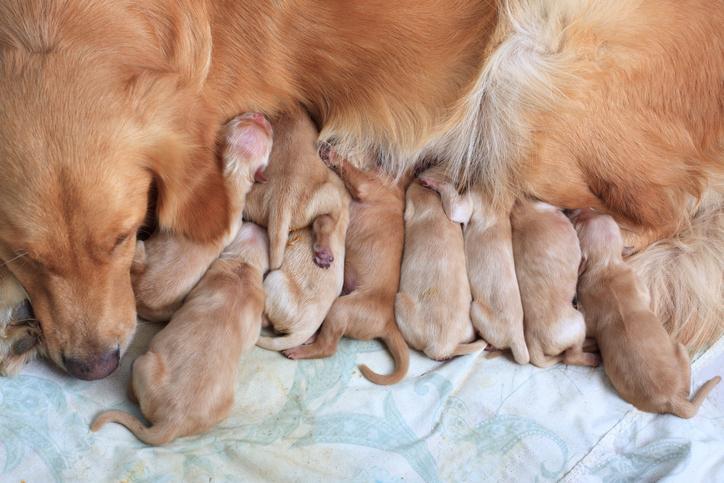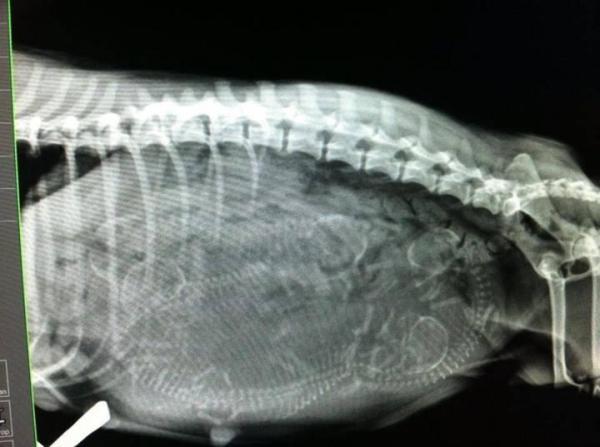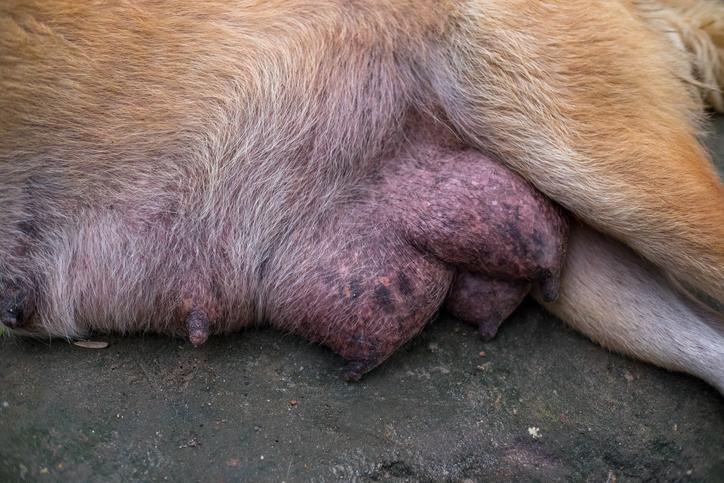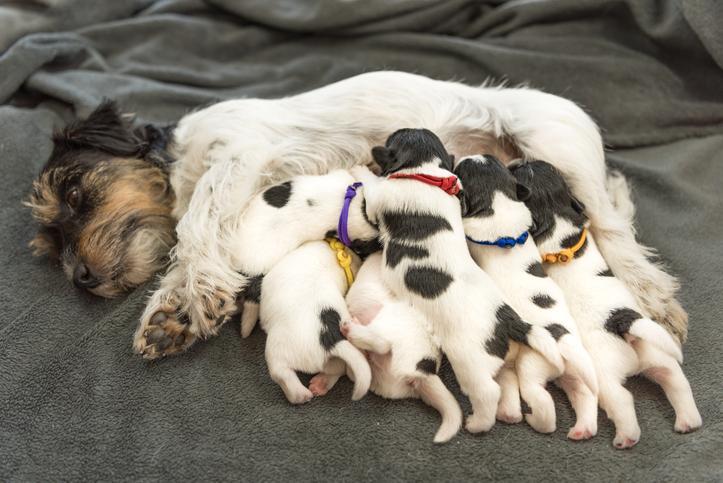Dog Panting After Giving Birth

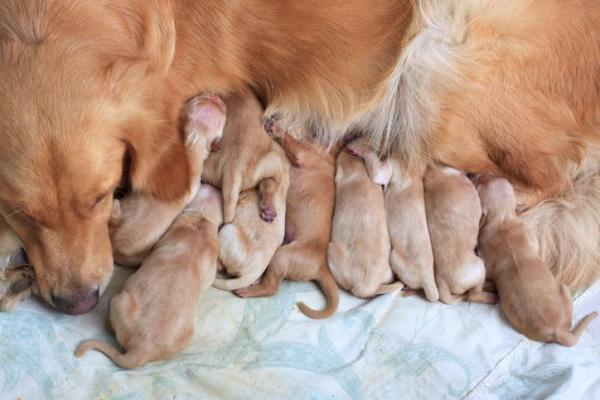

See files for Dogs
Is your dog panting after giving birth? If your dog is extremely restless, uncomfortable or nervous after giving birth, it is normal. However, if these do not remit, veterinary attention is required. Sometimes, after giving birth, bitches can experience complications which need to be attended to.
For more about what to expect after giving birth, keep reading this AnimalWised article. We will be discussing why your dog is panting after giving birth, in addition to deciphering when veterinary attention is necessary.
What to expect after a dog gives birth
After a gestation period of about two months, a dog will give birth. In general, this process will occur spontaneously and without any complications. A dog giving birth normally consists of:
- The first hours of a dog birthing process is characterized by uterine contractions. These contractions help to dilate the cervix through which the puppies will exit. Some bitches may experience restlessness or appear uncomfortable.
- During the second phase of giving birth, dogs will experience intensified contractions and the birth of the puppies will begin. During birthing, it is common to notice that your dog may experience anxiety, panting, licking or vomiting. These are normal behaviors that do not necessarily indicate the presence of a pathology. Puppies can sometimes exit the amniotic sac before being birthed, whereby you may notice a yellowish discharge. From then, the puppies should be born within minutes.
- In the third stage of labor, the placenta should be expelled shortly after the birth of each puppy. We recommend counting the placentas, making sure that the placenta to puppy ratio is equivalent.
It is normal for a bitch to tear the bags and umbilical cords, as well as eat her placentas. A mother dog will also lick her newborn puppies to clean them and remove any liquid remnants. The newborn puppies will immediately start to suckle.
For more, we recommend reading our article where we discuss, is my dog about to give birth - symptoms of labor.

Dog panting after giving birth
After reviewing the different phases that make up a dog’s delivery process, it’s normal to understand why a dog may be panting after giving birth; exhaustion. This is especially common in dogs that breed more than 3 puppies. Incredible effort is needed by a bitch to expel her puppies, therefore, panting or a dog shaking after giving birth is often caused by this released energy. It is, however, incredibly important to check how many puppies have been born, making sure that your female dog has managed to expel all of them properly.
Dog panting after giving birth allows a bitch to recover her breathing, inhale oxygen, regulate her temperature and, in short, prepare herself to take care of her newborns. If you do notice that your dog is having trouble recuperating after giving birth to her puppies, you can help her. Make sure she and her puppies have a quiet a calm environment to relax in, away from any stresses or stimulants. If you notice that your female dog is not feeding or cleaning her puppies, you should do it yourself (with extreme care). For more, check out our article where we offer you a diet for a prematurely weaned puppy.
Dog panting after giving birth: complications
Although we have mentioned that panting is common after the birthing process and that puerperium usually occurs without any complication, we must pay attention to specific signs. If, for whatever reason, you do notice any of these below mentioned symptoms, it may be an indication of a problem and veterinary consultation is required:
- Subinvolution of placentation sites: the uterus, logically, increases in size during pregnancy and, after delivery, returns to its original form. Sometimes this does not happen, which produces lochia (vaginal discharge) that persist for weeks. A diagnosis is confirmed by ultrasound. If this does occur, we recommend consulting a veterinarian as soon as possible.
- Metritis in dogs: it is a bacterial infection that occurs in the uterus. The causes for metritis in dogs is varied. Metritis symptoms include fever, lethargy, anorexia, vomiting, diarrhea, lochia with bad smell, etc. If not treated in time, the infection could spread,. Therefore immediate veterinary attention is recommended.
- Septic mastitis: in this case, infection occurs in a dog’s breasts. The dog will have experience fever and pain due to breast swelling. Veterinary treatment is necessary. If the infection affects lactation and the puppies are less than three weeks old, we should offer them artificial feeds, with formulated milk for dogs. For more, we recommend reading our article where we discuss everything you need to know about mastitis in dogs.
- Eclampsia: this disease is caused by a low level of calcium in the body. Eclampsia symptoms in include restlessness, mucous pallor and impaired breathing, which may explain why a female dog breathes very quickly after delivery. Keep reading for more detail.
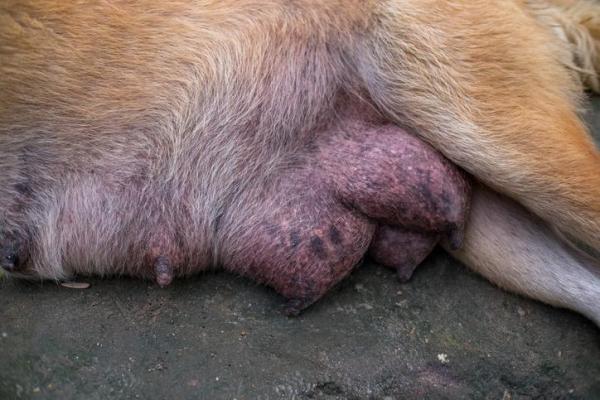
Eclampsia in dogs
Eclampsia, also known as milk fever, is a condition that can occur up to 2-4 weeks after a dog giving birth. Dogs suffering from eclampsia usually show lack of coordination and convulsions, in addition to excessive panting or very fast breathing. This requires veterinary emergency since it is caused by a decrease in calcium levels and is extremely dangerous.
This drop in calcium may appear as a result of improper nutrition during pregnancy or by the administration of calcium supplements without a veterinary prescription. For this reason, it is essential to always consult with a specialist before giving your dog any type of product or supplement for pregnant dogs. In addition, milk fever in dogs is more common in bitches that birth a larger litter.
Dog panting after giving birth: is it normal?
Eclampsia in dogs usually occurs at 2-4 weeks of labor, so, if your bitch is panting a lot straight after giving birth, we can conclude that it is not milk fever. Remember that during canine pregnancy, it is possible that sometimes more puppies are birthed than what was originally expected. Therefore, if your dog is panting after giving birth it may be because she is not done. If this situation lasts more than a few hours or your dog is struggling to expel the puppy, you should contact a veterinarian.
For more, we recommend reading our article where we look at all of the complications in dog labor.
Nursing dog panting and shaking
If this panting does not occur immediately after giving birth, but your dog breathes pants while breastfeeding, it may be caused by the aforementioned postpartum eclampsia in dogs. As we mentioned before, veterinary treatment is require. After performing the appropriate tests and reaching a correct diagnosis, a specialist will regulate the dog’s calcium levels by administering this mineral intravenously. In addition, it is possible that your dog’s glucose and magnesium levels have also been altered, therefore restoration is necessary.
Now, if eclampsia is not the cause, this panting my occur as a result of exhaustion. This is especially the case if your dog is feeding many puppies.
If none of the above coincide with your dog and the symptoms, we recommend reading our article where we discuss: dog breathing difficulties.
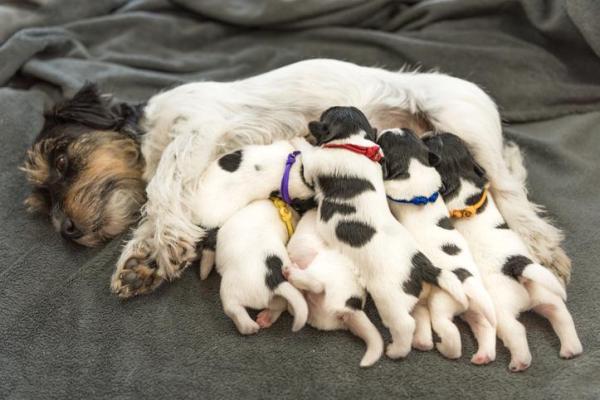
This article is purely informative. AnimalWised does not have the authority to prescribe any veterinary treatment or create a diagnosis. We invite you to take your pet to the veterinarian if they are suffering from any condition or pain.
If you want to read similar articles to Dog Panting After Giving Birth, we recommend you visit our Pregnancy problems category.






